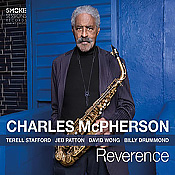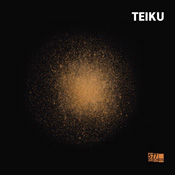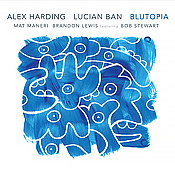Recent Recordings by Area Artists
This month’s batch of SEMJA-area jazz releases consists of a trio of singular gems that evidences the stylistic variety, artistry, and hard commitment to technical mastery as well as spiritual dedication that has been so characteristic of Detroit-centered music for generations.

Like many Detroit jazz players of his generation, Charles McPherson was not born there, but arrived with his family from the south while still a youngster. Until age nine he lived in Joplin, Missouri. But once his family relocated to the Motor City he was inspired at an early age by the rich jazz vibes around him, living just a few blocks from the Blue Bird Inn, and but five minutes away from Barry Harris, with whom he started taking lessons at age fifteen, just two years after taking up the alto sax, and started jamming with other youngsters, among them trumpeter Lonnie Hillyer and drummer Louis Hayes. McPherson and Hillyer were particularly close and once they moved to New York they played together, including at places such as the Five Spot, with their old teacher Harris (Tommy Flanagan once remarked that they were his two outstanding students). The two soon joined the Charles Mingus combo—making their recording debuts--and stayed off and on for over a decade after which they went out on their own with a new quintet. Since then, McPherson has worked constantly at refining his own take on the bebop language he absorbed during his youth, like many of his generation, staying true to the musical grammar and ethos instilled in him by Barry Harris with whom he continued to perform and study for years.
Now, at age 84, he has released a new album dedicated to the memory of his teacher and friend, Reverence, recorded during a five-day residence at SMOKE Jazz Club in New York, joined by Terell Stafford, trumpet, Jeb Patton, piano, David Wong, bass, and Billy Drummond, drums, with informative liner notes by Mark Stryker. McPherson is committed to staying true to his bop foundations without letting them get stale. His choice of tunes consists of four of his own compositions, including homages to Harris and Hillyer, as well as two well-worn ballads, “Come Rain or Come Shine,” and “Old Folks.” The former, a feature for the leader, is taken at a loping tempo, so that while sentimental it is hardly maudlin, as McPherson gives it a harder edge, exploiting various forms of phrasing, exploring his total command of the instrument, taking care that the blues are never far away, taking a bravura a capella escapade before the rhythm section joins him for an ending. The second ballad is mainly given over to Stafford. “Dynamic Duo,” based on rhythm changes, really digs in: seemingly pure bop, the excitement builds and when McPherson steps up, his solo just boils, taking it outside with rapid runs and large interval leaps, unpredictable phrasing, and gruff timbres that clearly pay homage to his long-ago bandmate Eric Dolphy. On the closing “Ode to Barry,” however, he stays closer to his traditional roots, with an exuberant solo that channels his old friend and mentor.
Reverence is thrilling because it shows how it is possible to develop a personal artistic trajectory that is rooted in a dedication to a specific set of aesthetic, stylistic, and musical values while absorbing various newer trends over decades. Taken on its own, it is exhilarating, filled with musical treasures, but it is also instructive to compare it to McPherson’s earliest recorded documents to witness how his technical command of the instrument has developed, how his sound, always highly personal, has acquired a resonance that can only come with the years, or how his harmonic and rhythmic resources have expanded. And yet there is a tangible personal thread that weaves throughout making him immediately identifiable. This is one to listen to again and again.

Pianist and electronics wizard Josh Harlow’s and drummer/percussionist Jonathan Barahal Taylor’s group Teiku reinterprets the songs of the Passover ceremony, drawing on family memories brought over from the western part of Russia, the Pale of Settlement, that is now Ukraine. Years ago, the two discovered that their families had preserved distinctive melodies not shared by others they grew up with. As they have expressed it, “Teiku arranges our unique family Passover melodies into vehicles for sonic exploration. This ancestral music, much like the tradition of Creative Music through which we interpret it, is liberation music. As its humble stewards we offer it as a call for justice for all oppressed peoples; as Jews, we decry the senseless violence, displacement, and killing perpetrated in our name.” The full realization of this is to be found on Teiku (577 Records) on which they are joined by Jaribu Shahid on double bass, singing bowls, and percussion, Peter Formanek on tenor and alto saxophones, and clarinet, as well as Rafael Leafar on bass clarinet, bass flute, tenor/soprano saxophones, and electronics.
This very personal project has been some time in the making and it has been fascinating to experience how it has developed. The combination of traditional scales and melodies with free improv is highly organic, and while blended, one or the other rises to the fore and then subsides, in ever shifting combinations. The short opening Adir Hu sets the tone, with out of tempo atmospheric jazzy playing that serves as a modern commentary to a recording of a family singing at a Seder. This is then followed by a powerful move right into the heart of the matters with the horns and piano singing together over rhythms, with Taylor’s rambunctious yet controlled drums setting the tone, leading into a powerful free jazz piano solo, eventually joined by the saxes, which likewise solo with abandon, quieting down and leading out. “Adir Yineh Rigalenu” settles down into more reflexive minor mode territory, dominated by piano and Formanek’s almost Klezmerish clarinet, leading to an impressive jazzy bass flute outing by Leafar. As the recital progresses the compositions become even more spiritually potent. The extensive instrumental palate provides a wide variety of tonal resources, as do the different modes the melodies are based on. Formanek and Leafar’s inspired solos cover a wide stylistic range from subtle plaintive melodic statements to wild exuberant cries. When Harlow, Shahid, and Taylor are playing on their own, one thinks how wonderful it would be to hear this trio on their own while at the same time looking forward to Teiku’s next project.
The last track, “Echad Mi Yodea (Who Knows One?),” rounds out the Seder with a traditional final song, here beginning, harking back to the opening, with a recording of a relative singing with spiritual simplicity as the music slowly takes over, out of tempo, but fed, as ever, by Taylor’s complex propulsive drumming, as the intensity mounts and Formanek, on clarinet, makes it all very modern, before it all subsides, after the voice returns, and the silence makes us reflect on all the myriad musical moments that have transpired and the long winding history and experience embedded in the Passover story.

Ever since his return from New York, where for years he played with everyone from David Murray to the Sun Ra Orchestra, Alex Harding has established himself as a regular on the Detroit area jazz scene, most often lately with his funky Organ Nation with Jim Alfredson and Djallo Djakate. He continues, however, to perform and record in New York, and one of his closest long-lasting partnerships is with pianist and composer Lucien Ban. The two have performed together in many contexts, most notably as a duo that is well known in our area from club and festival performances. Among their other collaborations is their ten years old jointly led Tuba Project, which is now documented, only for the second time on Blutopia. In addition to Harding on baritone saxophone and Ban on piano and Fender Rhodes, the personnel consists of Mat Maneri, viola & effects, Bob Stewart on tuba, and Brandon Lewis on drums.
Ban contributed four compositions, Harding penned one, the late Andrew Hill and Paul Motian one apiece and three were created on the spot by the five musicians. The group has been working off and on for a decade with the same personnel and has achieved an enviable cohesion that allows it to subtly bend rhythms and tonal palates at will and to create group improvisations that could be taken for notated preconceived musical statements. Maneri’s subtle viola and electronics work as a perfect foil for Harding’s exuberant baritone or Ban’s percussive piano passages and his solos and sonic commentaries are always created in a manner apposite to the group moment. Stewart provides the group with its defining sound profile, as he darts in and out of different roles: his tuba now walking like a string bass, taking the lead, or providing countermelodies. Ban never seems to stay still, constantly developing new musical contexts and concepts and his compositional and leadership mastery is fully at play here. The album is sensitively organized into a site of sorts, bookended by an initial atmospheric quiet improvised piece (“Speak our Silence”) and a poignant, seemingly through composed “Hymn” that alludes to Ban’s classical interests, preceded by a march like pointillistic group creation, the titular “Blutopia.” In between are seven very different compositions some simpler some more complex, with varying tonal palates and improvisational stances. Throughout, Harding is simply magnificent, playing with exuberant emotional majesty, with inexhaustible instrumental resources. One of the problems with the baritone saxophone in jazz is that many very good players stick to a limited sound palate, so that it simply sounds like “a bari.” Harding, however, can purr, scream, make percussive sounds (slap tongue), whisper and shout, lay down the dirty blues, charm on a ballad, take us to church, explore traditional harmonies or take the music out into cosmic sounds. But no matter how majestic his playing may be, like the rest of this wonderful group, it always fits into the moment, so that together with his co-leader Ban and the rest of the quintet, they offer us a recital of transcendent artistry.